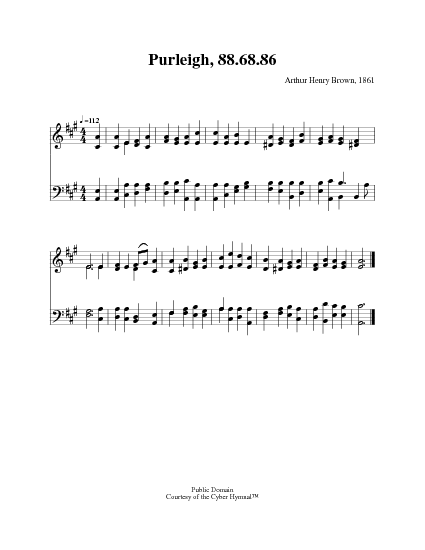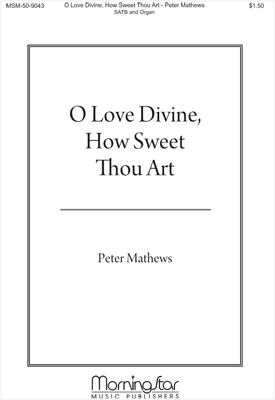- |
User Links
O Love Divine, How Sweet Thou Art

O Love divine, how sweet Thou art! When shall I find my willing heart
Author: Charles Wesley (1749)Published in 378 hymnals
Printable scores: PDF, MusicXMLAudio files: MIDI
Representative Text
1 O love divine, how sweet thou art!
When shall I find my longing heart
all taken up by thee?
I thirst, I faint, I die to prove
the greatness of redeeming love,
the love of Christ to me.
2 Stronger his love than death or hell;
its riches are unsearchable:
the first-born sons of light
desire in vain its depth to see;
they cannot reach the mystery,
the length and breadth and height.
3 God only knows the love of God;
O that it now were shed abroad
in this poor stony heart!
For love I sigh, for love I pine;
this only portion, Lord, be mine,
be mine this better part.
4 For ever would I take my seat
with Mary at the Master's feet:
be this my happy choice;
my only care, delight, and bliss,
my joy, my heaven on earth, be this,
to hear the Bridegroom's voice!
5 Thy only love do I require,
nothing on earth beneath desire,
nothing in heaven above:
let earth and heaven, and all things go,
give me thine only love to know,
give me thine only love.
Source: Ancient and Modern: hymns and songs for refreshing worship #751
Author: Charles Wesley
 Charles Wesley, M.A. was the great hymn-writer of the Wesley family, perhaps, taking quantity and quality into consideration, the great hymn-writer of all ages. Charles Wesley was the youngest son and 18th child of Samuel and Susanna Wesley, and was born at Epworth Rectory, Dec. 18, 1707. In 1716 he went to Westminster School, being provided with a home and board by his elder brother Samuel, then usher at the school, until 1721, when he was elected King's Scholar, and as such received his board and education free. In 1726 Charles Wesley was elected to a Westminster studentship at Christ Church, Oxford, where he took his degree in 1729, and became a college tutor. In the early part of the same year his religious impressions were much deepene… Go to person page >
Charles Wesley, M.A. was the great hymn-writer of the Wesley family, perhaps, taking quantity and quality into consideration, the great hymn-writer of all ages. Charles Wesley was the youngest son and 18th child of Samuel and Susanna Wesley, and was born at Epworth Rectory, Dec. 18, 1707. In 1716 he went to Westminster School, being provided with a home and board by his elder brother Samuel, then usher at the school, until 1721, when he was elected King's Scholar, and as such received his board and education free. In 1726 Charles Wesley was elected to a Westminster studentship at Christ Church, Oxford, where he took his degree in 1729, and became a college tutor. In the early part of the same year his religious impressions were much deepene… Go to person page >Text Information
| First Line: | O Love divine, how sweet Thou art! When shall I find my willing heart |
| Title: | O Love Divine, How Sweet Thou Art |
| Author: | Charles Wesley (1749) |
| Meter: | 8.8.6.8.8.6 |
| Language: | English |
| Copyright: | Public Domain |
English
- A Choice Selection of Evangelical Hymns, from various authors: for the use of the English Evangelical Lutheran Church in New York #48
- A Choice Selection of Evangelical Hymns, from various authors: for the use of the English Evangelical Lutheran Church in New York #292
- A Choice Selection of Psalms, Hymns and Spiritual Songs for the use of Christians #230
- A Church Hymn Book: for the use of congregations of the United Church of England and Ireland #147
- A Collection of Hymns #290
- A Collection of Hymns Adapted to the Use of the Methodist Episcopal Church #d436
- A Collection of Hymns Adapted to the use of the Methodist Episcopal Church Including the Whole Collection of the Rev. J. Wesley #ad436
- A Collection of Hymns and Psalms for the Use of Singing School and Musical Societies #d118
- A Collection of Hymns and Spiritual Songs, Generally Used at Camp and Prayer Meetings #d162
- A Collection of Hymns for Public, Social and Domestic Worship #d615 10 shown out of 236
Welsh
Notes
O Love divine, how sweet Thou art. C. Wesley. [Desiring to Love.] Appeared in Hymns and Sacred Poems, 1749, vol. i., in 7 stanzas of 6 lines as No. 5 of six hymns on "Desiring to Love" (Poetical Works, 1868-72, vol. iv. p. 341). Three leading centos are in common use:—
1. Composed of stanzas i., iii., iv. and vii. This was given in G. Whitefield's Hymns, &c, 1753, No. 86, as the second of two hymns on "Longing for Christ.” This cento was repeated by Madan, Toplady, and others in the older collections, and is that usually found in the Church of England hymn-books.
2. Composed of stanzas i.-iv. This was given in the Wesleyan Hymn Book, 1780, No. 141, and is in very extensive use in all English-speaking countries. In the revised edition of the Wesleyan Hymn Book, 1875, stanzas v., vi., of the original were added to the hymn.
3. Composed of stanza iv., vi., and iii., in the order named. This cento, beginning "0 that I could for ever sit," is in the American Songs for the Sanctuary, N. Y., 1865.
In addition to these other forms of the text beginning with stanza i. are in limited use. G. J. Stevenson's associations in his Methodist Hymn Book Notes, 1883, are most interesting.
--John Julian, Dictionary of Hymnology (1907)


 My Starred Hymns
My Starred Hymns


